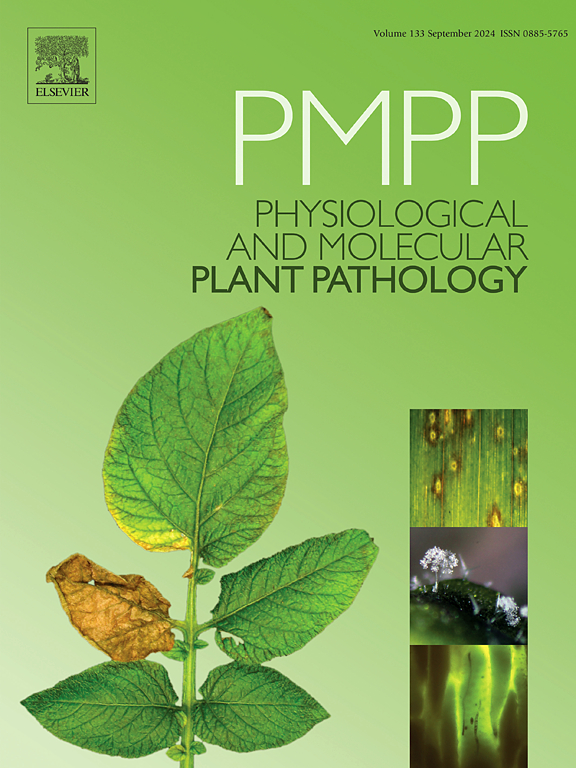YUCCA基因表达调控甜菜对Cercospora叶斑病(CLS)抗性和叶片再生:不同甜菜(Beta vulgaris L.)含糖量和根系产量的比较分析
IF 3.3
3区 农林科学
Q2 PLANT SCIENCES
引用次数: 0
摘要
生长素是植物的主要内源激素之一,在调节植物生长发育和逆境反应中起着关键作用。特别值得注意的是,生长素在生物胁迫中起着重要的作用。Cercospora叶斑病(CLS)是甜菜生长中的三大病害之一,可降低光合作用效率,甚至导致叶片死亡。当甜菜感染CLS后,为了维持其正常生长,新叶从甜菜根部继续发芽生长,进行光合作用,这必须有生长素参与。YUCCA基因家族属于B类黄素依赖单加氧酶,催化内源生长素生物合成的限速步骤,在植物生长调控和逆境响应中起重要作用。有效调控生长素的合成和积累是提高甜菜总产量和糖产量的重要目标,也是甜菜育种的重点。因此,本研究鉴定了甜菜(Beta vulgaris L.)中9个YUCCA基因。此外,转录组学分析显示两个显著差异表达的YUCCA基因在CLS感染前后的甜菜中表现出显著差异表达。这些YUCCA基因是参与甜菜生长素合成途径之一的吲哚-3-丙酮酸(IPyA)通路的关键基因。田间试验分析表明,敏感品种根系产量高,含糖量低,抗性品种根系含糖量高,产量低。本文章由计算机程序翻译,如有差异,请以英文原文为准。
YUCCA gene expression modulates Cercospora leaf spot (CLS) resistance, Leaf regeneration: A comparative analysis of sugar content and root yield in different Sugar beet (Beta vulgaris L.)
Auxin is one of the main endogenous plant hormones, playing a key role in regulating plant growth and development as well as stress responses. It is particularly noteworthy that the auxin plays a significant role in biotic stress. Cercospora leaf spot (CLS) is one of the three major diseases in sugar beet growth, which can reduce the efficiency of photosynthesis and even cause leaf death. When sugar beet is infected with CLS, in order to maintain its normal growth, new leaves continue to germinate and grow from the root of sugar beet for photosynthesis, which must have auxin participation. The YUCCA gene family, belonging to class B flavin-dependent monooxygenases, catalyzes the rate-limiting step in endogenous auxin biosynthesis and plays a crucial role in plant growth regulation and stress responses. Effective regulation of auxin synthesis and accumulation is a crucial objective for enhancing both total yield and sugar production in sugar beet, as well as a key focus in sugar beet breeding. Therefore, this study identified nine YUCCA genes in sugar beet (Beta vulgaris L.). Additionally, transcriptomic analysis revealed two significantly differentially expressed YUCCA genes, that exhibited significant differential expression in sugar beet before and after CLS infection. These YUCCA genes are key genes in the indole-3-pyruvic acid (IPyA) pathway, which is involved in one of the auxin biosynthesis pathways in sugar beet. And field experiment analysis revealed that susceptible sugar beet varieties exhibited higher root yield but lower sugar content, while resistant varieties showed higher sugar content but lower yield.
求助全文
通过发布文献求助,成功后即可免费获取论文全文。
去求助
来源期刊
CiteScore
4.30
自引率
7.40%
发文量
130
审稿时长
38 days
期刊介绍:
Physiological and Molecular Plant Pathology provides an International forum for original research papers, reviews, and commentaries on all aspects of the molecular biology, biochemistry, physiology, histology and cytology, genetics and evolution of plant-microbe interactions.
Papers on all kinds of infective pathogen, including viruses, prokaryotes, fungi, and nematodes, as well as mutualistic organisms such as Rhizobium and mycorrhyzal fungi, are acceptable as long as they have a bearing on the interaction between pathogen and plant.

 求助内容:
求助内容: 应助结果提醒方式:
应助结果提醒方式:


